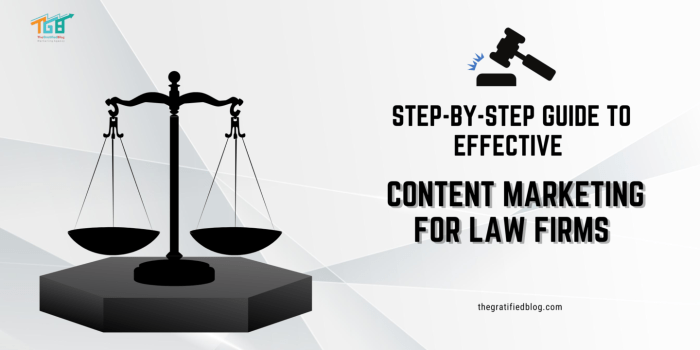Content marketing for attorneys is a powerful tool that can elevate a law firm’s presence in a competitive landscape. By strategically crafting and distributing valuable content, legal professionals can effectively engage their target audience, build trust, and showcase their expertise. This approach not only attracts potential clients but also fosters lasting relationships through informative and relevant communication.
The legal industry is evolving, and attorneys must adapt their marketing strategies to meet the demands of today’s consumers. Understanding the nuances of content marketing is crucial for attorneys looking to stand out while addressing the unique challenges faced by their clients. By employing various content types and targeted messaging, law firms can create impactful campaigns that resonate with their audience.
Understanding Content Marketing: Content Marketing For Attorneys

Content marketing in the legal industry involves creating and distributing valuable, relevant content to attract and engage a specific audience. For attorneys, this means delivering information that addresses the needs of potential clients while establishing the firm’s authority and credibility in the legal field.
The importance of content marketing for attorneys cannot be overstated. It serves as a critical strategy for building trust and relationships with clients, improving search engine visibility, and generating leads. A well-executed content marketing strategy allows law firms to showcase their expertise, ultimately leading to increased client acquisition and retention.
Key components of a successful content marketing strategy for law firms include understanding the target audience, creating high-quality content, utilizing appropriate distribution channels, and measuring the effectiveness of the content. By integrating these elements, attorneys can develop a cohesive and impactful content marketing plan.
Types of Content Suitable for Attorneys
Attorneys can create a variety of content types to engage their target audience. The following content forms are particularly effective in the legal industry:
- Blogs: Regularly updated articles that provide insights on legal issues, trends, and case studies.
- Videos: Engaging visual content that explains legal concepts or showcases client testimonials.
- Infographics: Visual representations of data or processes that simplify complex legal information.
- Podcasts: Audio content where attorneys discuss legal topics, share insights, and interview experts.
- Webinars: Live or recorded online seminars that delve into specific legal subjects, providing valuable knowledge to participants.
Effective case studies highlight how different content types can resonate with audiences. For instance, a law firm that produced a series of educational videos on personal injury claims saw a 30% increase in client inquiries. Additionally, leveraging social media channels to distribute this content amplifies its reach and engagement, inviting potential clients to interact directly with the firm.
Target Audience for Legal Content, Content marketing for attorneys
Defining the ideal client profile is crucial for attorneys to tailor content effectively. Factors such as demographics, legal needs, and pain points shape the type of content that resonates with potential clients. For instance, a family law attorney may target individuals going through divorce, while a corporate attorney may focus on business owners seeking compliance advice.
Methods for segmenting target audiences based on legal services offered include analyzing client data, conducting surveys, and engaging with potential clients through social media. By understanding specific client concerns—such as fear of high legal fees or uncertainty about the legal process—attorneys can create focused content that addresses these pain points directly.
Content Creation Strategies
To develop a content calendar for law firms, follow these steps:
- Identify key topics relevant to your practice area and target audience.
- Determine a consistent publishing schedule (e.g., weekly, bi-weekly).
- Allocate resources for content creation, including writers, designers, and editors.
- Incorporate seasonal or trending topics to keep content timely and relevant.
- Review and adjust the calendar based on content performance metrics.
Best practices for writing engaging and informative legal articles involve using clear language, avoiding jargon, and structuring content for readability. Including subheadings, bullet points, and relevant examples enhances user experience.
A checklist for ensuring content adheres to legal compliance standards includes verifying citation accuracy, avoiding misleading information, and obtaining necessary permissions for case studies or client testimonials.
Measuring Content Marketing Success
Key metrics to assess the effectiveness of content marketing for attorneys include website traffic, lead generation rates, engagement metrics (likes, shares, comments), and conversion rates from visitors to clients.
Collecting feedback and insights from clients can be achieved through surveys, reviews, and direct conversations. Understanding client perceptions of content helps refine future strategies and ensures relevance.
Tools and platforms such as Google Analytics, social media insights, and content management systems provide valuable data for tracking content performance. These tools enable attorneys to analyze which content resonates most with their audiences and adjust strategies accordingly.
Case Studies and Real-Life Examples
Detailed case studies of law firms successfully implementing content marketing include a personal injury firm that utilized blog posts and infographics to educate potential clients on their rights. This approach not only increased their web traffic by 50% but also significantly improved client engagement.
Lessons learned from failed content marketing efforts often highlight the importance of understanding the audience and creating content that genuinely addresses their needs. For example, a firm that focused heavily on jargon-laden articles without addressing client concerns saw minimal engagement and high bounce rates.
Identifying trends in successful content marketing strategies among top attorneys reveals a focus on authenticity, storytelling, and multimedia content integration. These firms often leverage a mix of formats to capture diverse audience preferences.
Adapting to Changes in Legal Marketing

Current trends affecting content marketing in the legal industry include the rising importance of video content, the need for mobile optimization, and an increased focus on client-centric messaging.
Staying updated with legal marketing regulations is critical to ensure compliance and maintain credibility. Changes in advertising rules and ethical considerations shape how attorneys approach content creation and distribution.
Future predictions for content marketing strategies for law firms suggest a growing emphasis on personalization and data-driven content creation. Attorneys who utilize analytics to tailor their content to specific client needs will likely see increased engagement and conversion rates. The integration of AI tools for content generation and client interaction is also expected to reshape how legal marketing operates.
Closing Notes

In summary, embracing content marketing for attorneys is essential for cultivating a strong online presence and effectively reaching potential clients. By implementing a robust content strategy that includes diverse content types and keen audience insights, law firms can not only showcase their legal expertise but also address client needs and concerns. As the legal landscape continues to change, staying ahead through innovative content marketing will play a pivotal role in a firm’s success.